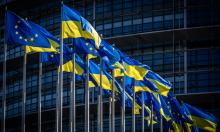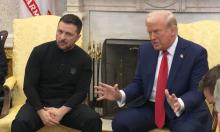Referendum does not bring unity to Cyprus
A plan to reunify Cyprus sponsored by United Nations Secretary General Kofi Annan was advanced for a referendum on Saturday. Two thirds of the Turkish Cypriots approved the plan, while three quarters of Greek Cypriots voted "no" in the referendum.
As one community voted "against" reunification will not take place. This means that only the Greek Cypriot south will join the European Union on May 1.
The next day after the crucial referendum was sunny and warm in Nicosia. As always on Sunday, the city woke up rather late. Car began appearing on streets at about nine o'clock.
Old Nicosia is a fortress built by Crusaders. It has the shape of almost an ideal circle a few km in diameter and 11 bastions. A line guarded by UN peacekeepers divides this circle into two equal parts. Residential blocks with half-ruined, empty houses are all over the city. Streets end with wire balls and barrels filled with sand and sprouting grass.
A board reading in three languages "UN Military Zone. No Passage" can be seen not far from a noisy Lebanese Maronite Christian church. An Orthodox church and a Muslim mosque are divided by the UN-guarded zone, but they are only a short distance from each other and priests and mullahs outcry each other during morning services.
To get to the Turkish part of the island I had to fill in a paper called a visa. Greek customs officers will take away everything, even a pack of cigarettes, I can inadvertently buy in the Turkish north. The Republic of Cyprus observes the economic embargo against the occupied territory. (Turkey invaded northern Cyprus 30 years ago after an attempted coup staged by Cypriot colonels who planned to unite with Greece. Ankara ventured to violate the UN Charter and other international laws to protect its compatriots. It invaded and seized a third of Cyprus and proclaimed the emergence of the Turkish Republic of Northern Cyprus.) I took a taxi, an old Mercedes car, to get to Kirinija, a tiny tourist town on the northern coast. The taxi driver spoke a blend of English, Greek and Turkish.
"I come from the southern part. I am a refugee from Larnaka. My name is Savash, or Savva in Greek. It is both of a Greek and Turkish origin," said the driver.
I asked him what he thought about yesterday's referendum.
"Well, Greeks voted 'no.' Let them leave the Cypriots alone, they will easier come to terms without mediators. They will come to an agreement and go to a pub to celebrate." Kyrenia is a tourist centre of the self-proclaimed Turkish quasi-state. It is a clean town decorated with flowers and covered with many red Turkish flags and the flags of the self-proclaimed state, which resembles the Turkish flag the other way around - a red crescent on the white background.
Flags are everywhere - they are even drawn on the mountain slopes and hoisted between the spurs of the Pentadaktilos mountain range soaring into the sky.
On the clean beach seafront, you can see portraits of the founder of the modern Turkish state Kemal Ataturk. Ataturk in a fez looks from a huge flag on Ataturk's statue in a European suit against the bay.
The owner of a small restaurant, a Turkish Cypriote Kemal is about 80 years old. He is a lively old man with carefully trimmed grey moustache, wearing a dazzling white panama. "Why are you speaking English to me?" he asked. Judging by the way he speaks Greek, it is clearly his native tongue. "Of course, I voted positive." "I hope now life will be easier," he added.
A young man, Fatih, is fishing near the quay. The water is so transparent that the fish can be seen from a distance. "I voted positive. It is the future of my children and my own future. I don't see why we cannot live together with Greeks." In the afternoon, Cyprus President Tassos Papadopoulos held a conference on the results of the referendum for foreign journalists. He tried to explain why the Greek community voted against the UN's unification plan.
There were too many complaints about the plan, said the president. They are - the preservation of the Turkish military presence (in fact, both Turkey and Greece will have to gradually reduce their military presence on the island), and the ban on the return of thousands of refugees to their homes in northern Cyprus.
Indeed, after Greek Cypriotes join the EU on May 1, they will have the right to choose where to live in the EU - anywhere apart from the northern part of their home occupied by Turks.
Our decision to deny this plan was weighted and substantiated, said Mr. Papadopoulos. The Greek community denied not the peaceful solution as a whole but Mr. Annan's specific plan, which has too many deficiencies.
We are not celebrating the results of the referendum. There can be no winners here, added the president. (The results of the referendum were quite predictable. First, leader of the Turkish part of the island Rauf Denktas occupied a destructive position on Mr. Annan's plan from the very beginning and even threatened to resign if the referendum had positive results. Then leader of the Greek community Tassos Papadopoulos did everything possible to make it fail on the Greek part of the island.) After the plan is adopted, the existence of our republic will be in question. We have no guarantees that Turks will fulfil their promises, stressed Mr. Papadopoulos. Apparently, his arguments have had the necessary effect on the Greek Cypriotes.
A Greek Cypriote, Antonis, 28, agrees with the Cypriote president.
"My parents voted positive but I voted against it. This plan was unrealistic," says Antonis. "I will always support a single state. I'm sure that we can find a compromise with Turkish Cypriotes. Our island is too small for two states."
Subscribe to Pravda.Ru Telegram channel, Facebook, RSS!





